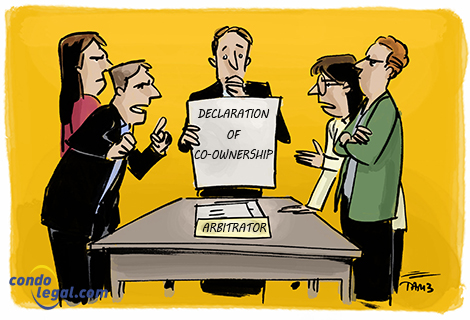 Conflicts in co-ownership often arise due to a lack of knowledge of the rules governing the building, but also due to a lack of communication or transparency, or because of a misunderstanding that has gone wrong.
Conflicts in co-ownership often arise due to a lack of knowledge of the rules governing the building, but also due to a lack of communication or transparency, or because of a misunderstanding that has gone wrong.
To ensure that co-ownership is synonymous with peace and peace of mind, it is best to adopt good habits from the beginning. The buyer of a condominium unit must therefore commit to accepting a very specific way of life, akin to a kind of micro-society. Condominiums have a bright future if social harmony is cultivated among all residents. To achieve this, crisis situations must be avoided or managed as well as possible.
Relying on the letter of the declaration of co-ownership is often very effective and slows down behaviour that does not comply with it. As such, it is good to know that it is never advisable to let infringements pass without saying anything, at the risk of opening the door to a host of other irregularities.
To manage difficult situations, and before any confrontation, do not hesitate to use the external resources made available to you, in particular by the municipal services:
If, however, open conflict is unavoidable, you should know that litigation is not the only outcome. Rather than having a court decision imposed on you that is sometimes unsatisfactory, why not immediately consider trying to settle the dispute amicably, for a solution that suits both parties?
The task of a mediator is precisely to reach a common solution. Mediation is particularly recommended in condominiums, because the trial will only lead to a declaration of open war in an environment where, in any case, the two parties will have to irremediably coexist. It should be remembered that most declarations of co-ownership include a mediation clause and an arbitration clause. These little-known clauses force the disputing parties to call on a mediator or arbitrator to settle their dispute, before going to court. And if the only way out of the conflict is within the jurisdiction of a court, it should be noted that most of the time, the co-owners found to be at fault end up leaving the building.
Finally, you should be aware that even when a legal proceeding is ongoing, your attorney is still able to negotiate an out-of-court settlement with the opposing attorney. An agreement will always be preferred to maintain healthy relations between the co-owners.
Yves Joli-Coeur, Ad. E.
Lawyer
Dunton Rainville
3055 Boulevard Saint-Martin O
Bureau 610
Laval, QC H7T 0J3
Tél. : (450) 686-8683
Courriel : [email protected]
Chronic express the personal opinions of the author and in no way engage the responsibility of the site editor , CondoLegal.com Inc. The content and opinions expressed in a column are those of the author.

